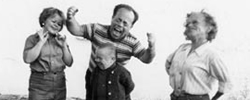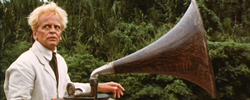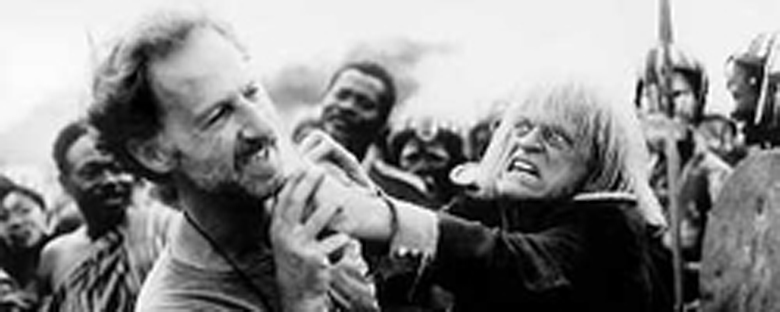Credits
Feature by: Rumsey Taylor
Posted on: 14 December 2004
Related articles:
Features: The Enigma of Bruno S.
External links:
Werner Herzog has directed over fifty films, and his work can be abridged as a collection of images: a boat lodged in the ceiling of a rainforest; a dancing chicken; a community of dwarfs; a “ski-flyer” seen in slow motion; a meal consisting of a shoe marinated in a stew of herbs; or a steamboat caught in an Amazonian current. The examples are endless.
Herzog’s work is dispersed evenly between fiction and nonfiction, ranging variously between directly incomparable topics as well as differentiated historical settings. There are, despite this, consistent themes between each of Herzog’s films, be it the hypnotic monotone with which he narrates his own documentaries, or the actual risks that accompany the productions of Aguirre, La Soufriére, or Fitzcarraldo.
The summary of this particular filmmaker’s entire body of work is compromising, as variety is the routine, distinguishing feature of Herzog’s films. (This is not to mention Herzog’s admitted search for an “ecstatic truth,” which is also evident in much of his work.) To highlight the immense ambition of one of film’s most stubborn iconoclasts, we present our responses to fourteen of his films, as well as two about him by Les Blank.
Signs of Life

Signs of Life is among Herzog’s simplest features. It’s a delightfully quiet, respectful exploration of lives of little consequence, dotted with moments of profound beauty and joy. It’s truly a pleasure to watch Herzog’s genius unleashed for the first time, and to think of everything that lies ahead of this brash young director.
Even Dwarfs Started Small

Werner Herzog and the makers of Jackass have much in common: a willingness to risk life and limb for the sake of visual entertainment, a boundless desire to portray the extreme and the grotesque, and a fondness for dwarfs. Indeed, Herzog could easily be classified as a provocateur or a director of gimmicks if it were not for his often intensely sedate style.
Fata Morgana

Wandering around the Sahara Desert in order to film mirages, Herzog compiled a mass of hallucinatory footage documenting a barren, alien landscape and a civilization pockmarked by the assault of technology and colonialism. Exotic animals, gutted structures, rusting vehicles, orientalist tourists and their bewildered subjects—each is a fragment of a hazy and disassembled culture mapped onto a desert wasteland.
Land of Silence and Darkness

One of the things that distinguishes Herzog as a director is his profound capacity for empathy. His gift enables him to get deep inside his subjects, and he is rewarded with moments of stark revelation and clarity. Here, in his very first documentary, that empathy is fully present, and it grants the viewer access to both the most sacred and profane elements of an obscure, if not entirely ignored community of people.
Aguirre: The Wrath of God

Gonzalo Pizarro leads this army, whose incongruity of transport exploits their vulnerability. He is driven, pompous, and partially ignorant—traits mirrored in Herzog for leading his crew into identical endurances. His resulting work is one of rare audacity.
The Great Ecstasy of Woodcarver Steiner

Much of the film consists of extreme slow-motion footage of Walter Steiner coasting in the air from left-to-right. Sometimes, he falls, and we see with graphic clarity the result of the altitude of 150 meters and the 110 kph that conspire to wreck and flail his body across a landing slope.
The Enigma of Kaspar Hauser

There is a profound philosophy at the base of Kaspar Hauser: how does emotional growth occur, deprived of any foreign influence, sociological, familial and otherwise?
Heart of Glass

This prediction of the Germany of the twentieth century and beyond—including the two world wars and other events of an apocalyptic time to come—gives the film an air of fatalism, suggesting humanity’s susceptibility to mass-delusion and the inevitable deterioration that results. But as in Kaspar Hauser, it is the possession of a unique vision—however, obscure or incommunicable—that provides some glint of hope for a dissipating humanity.
How Much Wood Would A Woodchuck Chuck

Werner Herzog’s interest in auctioneering, in addition to its Amish heritage and tie to German immigration, has not to do with translation, but with the fascination that the practice has emerged with a very precise and limited utility: to announce head of cattle, negotiate prices for them, and sell them with almost inhuman speed.
Stroszek

“We can’t stop the dancing chicken. Send an electrician.”
La Soufriére

In Guadaloupe, 1976, seismic activity at La Soufriére forecasts an immense volcanic eruption. The prediction results in an exodus of the entire island except for a homeless man, who waits on the side of the rumbling mountain with his arms crossed; an acceptant and inevitable corpse, he thinks.
Nosferatu the Vampire

This fascination with detail in both the natural world and in the actors’ performances creates an altogether different approach to the horror genre. Herzog’s film underscores the proximity of death, decay, and evil in reality, and in so doing, it draws this horror story out of the realm of fantasy and into history.
Woyzeck

Though it is a strangely powerful, fascinating film, Woyzeck is something of an aberration in Herzog’s oeuvre. The film is very theatrical in appearance, consisting mainly of a series of long takes, during which the camera is often motionless.
Werner Herzog Eats His Shoe

Having arrived at Berkeley to host an exhibition of his films, Werner Herzog removes his shoes, places them in a pot with garlic and other herbs, and walks barefoot to a shoe store. If this seems bizarre, it is only because you may not be familiar with the legendary exploits of the ridiculously ambitious German director.
Fitzcarraldo

Fitzcarraldo seems to exist largely in his mind, driven by a combination of Enrico Caruso records and an unending series of doomed pet projects, all of which consume him utterly.
Burden of Dreams

Familiarity with Werner Herzog’s film, or even with reviews of it (virtually every one mentions its near-foiled production), allows Blank’s film to achieve a unique significance—it’s Fitzcarraldo with affirmed and not sublime biography; in essence, the same film without the pretense of fiction.
Lessons of Darkness

Lessons in Darkness turns a portrait of post-Gulf War Kuwait as a documentary about an alien planet. But Lessons is a more localized, more contextualized, and still more reflexive film. And with its depictions of torture-chambers, fields of fire, and lakes of oil, it is also a more overtly political one.
Little Dieter Needs to Fly

An account of Dieter Dengler’s life—from his childhood in a decimated post-war Germany to his experiences in the hands of the Viet Cong—the film presents a compassionate and personal story of the brutality and oddity of war.
We don’t do comments anymore, but you may contact us here or find us on Twitter or Facebook.



